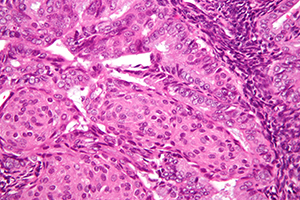Combining Immunotherapy and Targeted Therapy to Treat Endometrial Cancer
The U.S. FDA approved a combination of a molecularly targeted therapeutic and an immunotherapeutic to treat certain patients with uterine cancer.
The U.S. Food and Drug Administration (FDA) approved the combination of the immunotherapeutic pembrolizumab (Keytruda) with the molecularly targeted therapeutic lenvatinib (Lenvima) to treat certain patients with advanced endometrial cancer. The approval confirmed the accelerated approval the agency granted the combination in September 2019.

The FDA approval of pembrolizumab plus lenvatinib is intended for women with advanced endometrial cancer that is neither microsatellite instability-high nor mismatch repair-deficient, and whose disease progressed after prior systemic therapy, but are who not candidates for curative surgery or radiation.
Pembrolizumab is an immune checkpoint inhibitor, a class of cancer immunotherapeutics that targets the immune system’s natural brakes. Pembrolizumab targets the protein PD-1, a crucial component of the brake system on immune cells called T cells. Some cancer cells exploit the immune checkpoint to prevent T cells from attacking and destroying them. By targeting PD-1, pembrolizumab releases the brake to help T cells fight cancer.
Lenvatinib targets a family of proteins called tyrosine kinases, which promote cancer cell proliferation, metastasis, and the growth of the blood and lymphatic vessel networks that tumors establish to grow and survive. Because lenvatinib targets many tyrosine kinases, it can block many of these functions at once.
The approval was based on a multicenter, open-label, randomized, active-control clinical trial that involved 817 patients with advanced endometrial carcinoma previously treated with at least one prior platinum-based chemotherapy either before or after surgery. Patients given pembrolizumab plus lenvatinib had a median progression-free survival of 6.6 months, compared with 3.8 months among patients given chemotherapy.
Endometrial cancer is the most common form of uterine cancer, affecting the inner lining of the uterus. More than 66,000 women in the United States were expected to develop endometrial cancer and nearly 13,000 were expected to die of the disease in 2021.
The FDA decision was rendered on July 21, 2021.
